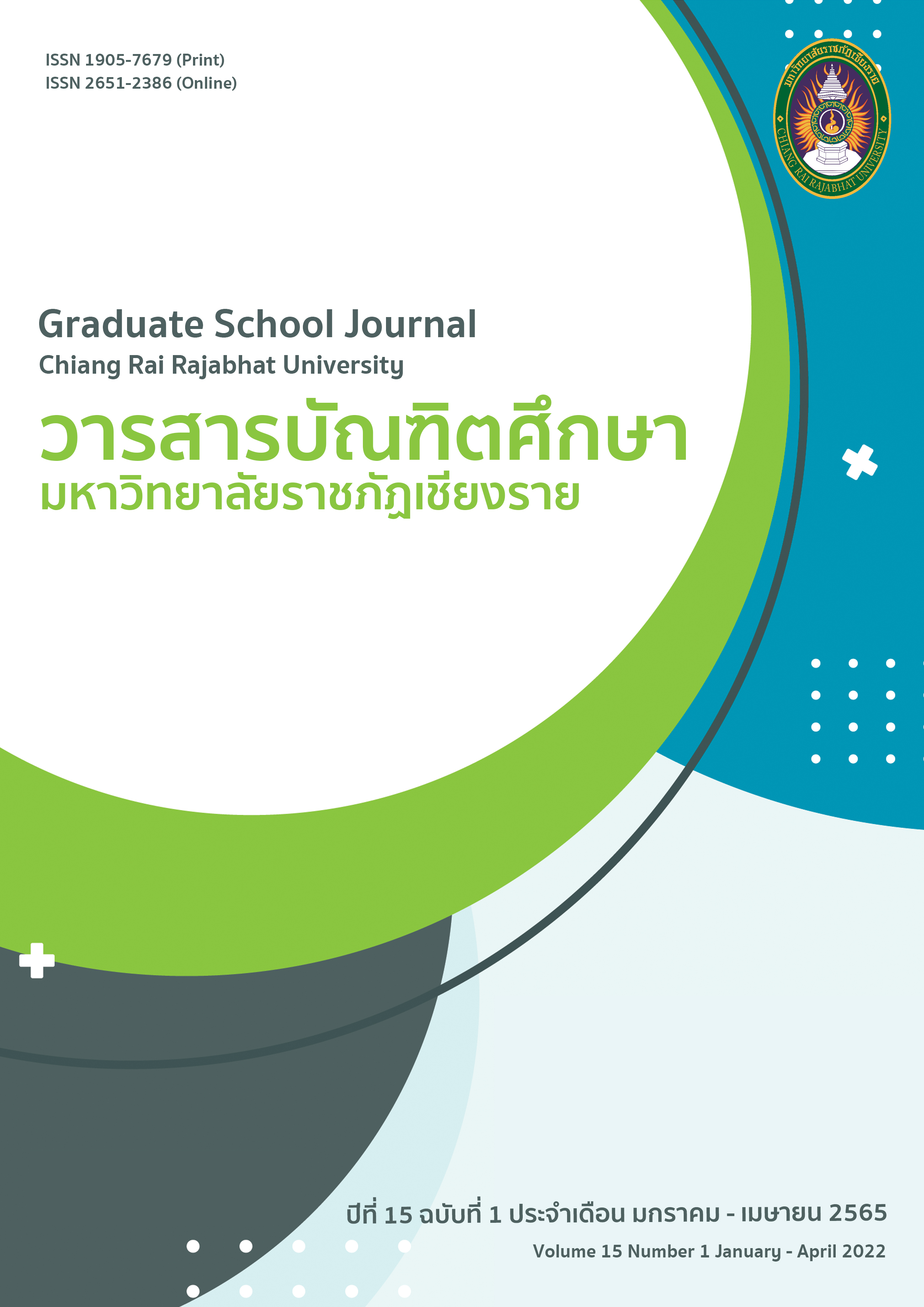ลักษณะภาษาและคุณค่าในชื่อภาษาจีนของนิสิตไทย
Main Article Content
บทคัดย่อ
บทความวิจัยนี้มีวัตถุประสงค์เพื่อศึกษาลักษณะทางภาษาในชื่อภาษาจีนของนิสิต ด้านชนิดของคำ กลวิธีการสร้างชื่อ และประเภทความหมาย อีกทั้งวิเคราะห์คุณค่าของชื่อภาษาจีนที่มีต่อตัวผู้เรียนและผู้สอน กลุ่มตัวอย่างที่นำมาศึกษา คือ ชื่อภาษาจีนของนิสิตสาขาวิชาภาษาจีน
คณะมนุษยศาสตร์ มหาวิทยาลัยนเรศวร ทั้งเพศชายและเพศหญิง 4 ชั้นปี จำนวนทั้งสิ้น 341 รายชื่อ คิดเป็น 653 คำ และการสัมภาษณ์อาจารย์ผู้สอนภาษาจีน จำนวน 6 คน เป็นงานวิจัยเชิงปริมาณ และคุณภาพ วิเคราะห์ข้อมูลโดยการใช้ค่าร้อยละและการพรรณนาวิเคราะห์ ผลการวิจัยด้านชนิดของคำ พบว่า คำคุณศัพท์ถูกนำมาตั้งเป็นชื่อภาษาจีนมากที่สุด คิดเป็นร้อยละ 47.47 รองลงมา คือ คำนาม คิดเป็นร้อยละ 45.63 ส่วนคำที่พบน้อยที่สุด คือ คำลักษณนาม คำสรรพนาม คำบุพบท และคำเสริม คิดเป็นร้อยละ 0.15 ด้านกลวิธีการสร้างชื่อ พบการประสมคำมากที่สุด คิดเป็นร้อยละ 78.30 ในขณะที่การซ้ำเสียงถูกใช้น้อยที่สุด คิดเป็นร้อยละ 2.35 ด้านประเภทความหมายของชื่อ ชื่อนิสิตส่วนใหญ่ มีความหมายเกี่ยวกับความงามและความบริสุทธิ์ คิดเป็นร้อยละ 27.71 ทั้งนี้ ชื่อที่มีความหมายเกี่ยวกับจำนวนและปริมาณถูกพบน้อยที่สุด ร้อยละ 0.15 ในด้านคุณค่าของชื่อภาษาจีนที่มีต่อตัวผู้สอน พบว่า ชื่อภาษาจีนช่วยอำนวยความสะดวกในการเรียกขานให้แก่อาจารย์เจ้าของภาษา อีกทั้งยังเป็นเครื่องมือในการถ่ายทอดความรู้ทางภาษาและสะท้อนให้เห็นถึงวัฒนธรรม ด้านคุณค่าต่อตัวผู้เรียน พบว่า ชื่อภาษาจีนคือส่วนหนึ่งที่ช่วยพัฒนาทักษะด้านอักษรจีน และเสริมสร้างความมั่นใจให้แก่ผู้เรียน นอกจากนี้ยังเปรียบเสมือนใบเบิกทางที่ทำให้เกิดการยอมรับในการเข้าสู่สังคมจีน ตลอดจนเป็นสัญลักษณ์ใหม่แทนตัวผู้เรียนในสังคมการศึกษาและการทำงานที่เกี่ยวข้องกับประเทศจีนในอนาคต
Article Details

อนุญาตภายใต้เงื่อนไข Creative Commons Attribution-NonCommercial-NoDerivatives 4.0 International License.
บทความที่ได้รับการตีพิมพ์เป็นลิขสิทธิ์ของวารสารมหาวิทยาลัยราชภัฎเชียงราย
ข้อความที่ปรากฏในบทความแต่ละเรื่องในวารสารวิชาการเล่มนี้เป็นความคิดเห็นส่วนตัวของผู้เขียนแต่ละท่านไม่เกี่ยวข้องกับมหาวิทยาลัยราชภัฎเชียงราย และคณาจารย์ท่านอื่นๆในมหาวิทยาลัยฯ แต่อย่างใด ความรับผิดชอบองค์ประกอบทั้งหมดของบทความแต่ละเรื่องเป็นของผู้เขียนแต่ละท่าน หากมีความผิดพลาดใดๆ ผู้เขียนแต่ละท่านจะรับผิดชอบบทความของตนเองแต่ผู้เดียว
เอกสารอ้างอิง
พระอุดมธีรคุณ, และบัณฑิกา จารุมา. (2563). ภาษาและวัฒนธรรม : ความหมาย ความสำคัญ และความสัมพันธ์ระหว่างกัน. วารสารมหาจุฬาวิชาการ, 7(2), 53-63.
ฟาง ฟาง. (2554). การตั้งชื่อคนไทยและการตั้งชื่อคนจีน: การศึกษาเปรียบเทียบ (วิทยานิพนธ์ ศิลปศาสตรมหาบัณฑิต). มหาวิทยาลัยเกษตรศาสตร์. กรุงเทพฯ.
เม่าไห่ จง, สมเกียรติ รักษ์มณี, และบุญเลิศ วิวรรณ์ (2561). การศึกษาเปรียบเทียบคำเรียกผีและการตั้งชื่อผีในวัฒนธรรมความเชื่อเรื่องผีของไทยกับจีน. วารสารบัณฑิตศึกษา มหาวิทยาลัยราชภัฏเชียงราย, 11(1), 99-112.
สำนักงานราชบัณฑิตยสภา. (2554). พจนานุกรมฉบับราชบัณฑิตยสถาน พ.ศ. 2554. สืบค้นเมื่อจาก https://dictionary.orst.go.th/
วิรัช ศิริวัฒนะนาริน. (2544). การศึกษาการตั้งชื่อของคนไทย. (วิทยานิพนธ์อักษรศาสตรมหาบัณฑิต). มหาวิทยาลัยศิลปากร. นครปฐม.
วิไล ธรรมวาจา. (2559). ทัศนคติของนักศึกษาชาวจีนที่มีต่อชื่อภาษาไทย. วารสารศิลปศาสตร์ปริทัศน์, 11(22), 28-39.
สาริสา อุ่นทานนท์. (2551). การตั้งชื่อของคนลาว: คำและความหมาย. วารสารมนุษยศาสตร์และสังคมศาสตร์ มหาวิทยาลัยขอนแก่น, 27(3), 86-99.
สุภาพรรณ ณ บางช้าง. (2529). การใช้ภาษาในการตั้งชื่อของคนไทย. กรุงเทพฯ: จุฬาลงกรณ์มหาวิทยาลัย.
เสี่ยวอันต้า. (2547). ไวยากรณ์จีน. กรุงเทพฯ: ทฤษฎี.
อมรรัตน์ วันยาว. (2545). การตั้งชื่อของกลุ่มชาติพันธุ์ไทในเขตอำเภอขวาง จังหวัดกาฬสินธุ์ (วิทยานิพนธ์การศึกษามหาบัณฑิต). มหาวิทยาลัยมหาสารคาม. มหาสารคาม.
Ouyang, M. (2014). A comparative study of Chinese name and Thai name. (Master’s thesis). Guangxi University for Nationalities. Guangxi.


